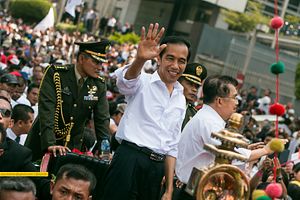Indonesian President Joko “Jokowi” Widodo is paying a state visit to China this week, marking his second trip to Beijing since he assumed office in October 2014. After meetings in Beijing with Chinese leaders, Jokowi will join other regional leaders (including Sri Lankan Prime Minister Maithripala Sirisena) at the Boao Forum in Hainan Province.
In his meeting with Chinese President Xi Jinping, Jokowi noted approvingly that “our cooperation in all fields has progressed” since the two last met, on the sidelines of the November 2014 APEC summit in Beijing. Jokowi assured Xi that “Indonesia is committed to deepening its cooperation with China at the bilateral, regional, and international levels.”
The focus for this cooperation was clear even before Jokowi arrived: boosting trade and investment. During their talks, Jokowi and Xi noted that China and Indonesia are quite complementary economically. As Jokowi put it, “Indonesia has rich natural resources, and China has knowledge and experience in the field of infrastructure.”
In an interview with South China Morning Post, Jokowi said he was particularly interested in “infrastructure and manufacturing developments.” Jokowi also listed highways, railroads, power plants, and ports as ripe for joint projects between Chinese and Indonesian firms. Jokowi noted that China is only the 13th largest investor in Indonesia and promised to remove bureaucratic obstacles responsible for the slow trickle of Chinese investment.
Meanwhile, Xi promised to support Indonesia in developing maritime infrastructure, both by encouraging Chinese firms to invest and by sponsoring projects through the Asian Infrastructure Investment Bank (AIIB) and the Silk Road Fund.
Jokowi made a similar call for investment in Indonesia at the 2014 APEC summit. In that speech, he noted Indonesia’s pressing need for foreign investment to fund infrastructure projects. “In five years we want to build 24 seaports and deep seaports,” Jokowi said. “We have 17,000 islands, so we need seaports and deep seaports. And this is your opportunity: 24 seaports and deep seaports.”
There’s great potential for overlap between Jokowi’s call for more Indonesian ports (part of his ambition to turn Indonesia into a “global maritime fulcrum”) and the offer of Chinese investment in Indonesia’s maritime infrastructure through the framework of the Maritime Silk Road. In fact, the idea of the Maritime Silk Road was first announced during a speech Xi gave before the People’s Representative Council of Indonesia in October 2013. However, Jokowi indicated that he would need more details before committing to the project. “Until now, I don’t know the details of the Silk Road agenda,” he told SCMP. “But if the cooperation can give benefit to my people and can give benefit to our national interest and also to China, OK.”
Jokowi must have liked what he heard today, as the joint statement issued after his meeting with Xi noted that “the 21st Century Maritime Silk Road, proposed by President Xi Jinping, and the Strategy of the Global Maritime Fulcrum initiated by President Joko Widodo are complementary.” The statement also said that the two countries would develop a “maritime partnership.”
Jokowi’s trip to China comes after a stopover in Japan, where he and Japanese Prime Minister Shinzo Abe unveiled the idea of a new maritime forum to ensure “maritime safety and security.” During his time in Tokyo, Jokowi made headlines by saying that China’s nine-dash line (which denotes China’s claims in the South China Sea) “has no basis in an international law.” However, as The Diplomat’s Prashanth Parameswaran pointed out, that is not a new position for Indonesia and does not imply that Jakarta is rejecting China’s claims to maritime features in the region. Instead, Indonesia continues to position itself as a neutral party, and a possible mediator, in the maritime disputes between China and ASEAN claimants.

































